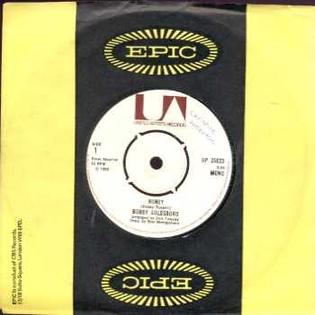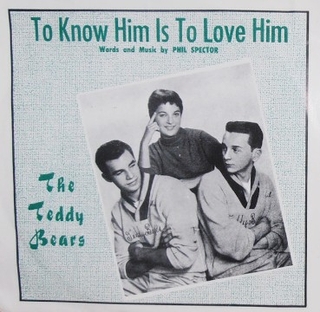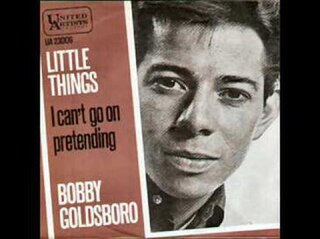
"Hold Me, Thrill Me, Kiss Me" is a song written by Harry Noble and originally performed by Karen Chandler in 1952. It has been re-recorded several times since then, the most notable covers being by Mel Carter in 1965 and Gloria Estefan in 1994.

"Honey", also known as "Honey (I Miss You)", is a song written by Bobby Russell. He originally produced it with former Kingston Trio member Bob Shane, who was the first to release the song. It was then given to American singer Bobby Goldsboro, who recorded it for his 1968 album of the same name, originally titled Pledge of Love. Goldsboro's version was a hit, reaching No. 1 in several countries.
"Mountain of Love" is a song written by Harold Dorman. Dorman released his version as a single in 1960. It was originally recorded in late 1959 at the Royal Recording Studios in Memphis before the backing vocals were overdubbed. It performed well, spending 19 weeks on the Billboard Hot 100 chart, peaking at No. 21 in May 1960, while reaching No. 7 on the Billboard Hot R&B Sides chart, and No. 25 on Canada's "CHUM Hit Parade". The song was his only top forty hit on the Billboard Hot 100 and was the highest-charting single of his career.

"Take Good Care of My Baby" is a song written by Carole King and Gerry Goffin. The song was made famous by Bobby Vee, when it was released in 1961.
"If I Were a Carpenter" is a folk song written by Tim Hardin in the 1960s, and re-recorded with commercial success by various artists including Bobby Darin, The Four Tops and Johnny Cash. Hardin's own recording of the piece appeared on his 1967 album Tim Hardin 2. It was one of two songs from that release performed by Hardin at Woodstock in 1969. The song, believed by some to be about male romantic insecurity, is rumored to have been inspired by his love for actress Susan Morss, as well as the construction of Hardin's recording studio.

"Go Away Little Girl" is a popular song written by Gerry Goffin and Carole King. It was first recorded by Bobby Vee for Liberty Records on March 28, 1962. The lyrics consist of a young man asking a young attractive woman to stay away from him, so that he will not be tempted to betray his steady girlfriend by kissing her. The song is notable for making the American Top 20 three times: for Steve Lawrence in 1963, for The Happenings in 1966, and for Donny Osmond in 1971. It is also the first song, and one of only nine, to reach US number 1 by two different artists. Also notable in each of the solo versions is the similar double-tracked treatment of the singer's voice.
"By the Time I Get to Phoenix" is a song written by Jimmy Webb. Originally recorded by Johnny Rivers in 1965, it was reinterpreted by American country music singer Glen Campbell on his album of the same name. Released on Capitol Records in 1967, Campbell's version topped RPM's Canada Country Tracks, reached number two on Billboard's Hot Country Singles chart, and won two awards at the 10th Annual Grammys. Broadcast Music, Inc. (BMI) named it the third most performed song from 1940 to 1990. The song was ranked number 20 on BMI's Top 100 Songs of the Century. Frank Sinatra called it "the greatest torch song ever written." It was No. 450 on Rolling Stone magazine's Top 500 Songs of All Time.

"To Know Him Is to Love Him" is a song written by Phil Spector, inspired by the words on his father's gravestone, "To Know Him Was to Love Him". It was first recorded by the only vocal group of which he was a member, The Teddy Bears. The single spent three weeks at No. 1 on the Billboard Hot 100 chart in 1958, while reaching No. 2 on the UK's New Musical Express chart. Peter & Gordon and Bobby Vinton later each experienced chart success with the song, in 1965 and 1968, respectively.

"Da Doo Ron Ron (When He Walked Me Home)" is a song written by Jeff Barry, Ellie Greenwich and Phil Spector. It first became a popular top five hit single for the American girl group the Crystals in 1963. American teen idol Shaun Cassidy recorded the song in 1977 and his version hit number one on the Billboard Hot 100 chart. There have also been many other cover versions of this song, including one by the songwriters Jeff Barry and Ellie Greenwich themselves, performing as the Raindrops.

"Mr. Lonely" is a song co-written and recorded by American singer Bobby Vinton, backed by Robert Mersey and his Orchestra. The song was first released on Vinton's 1962 album, Roses Are Red.
"Susie Q" is a rockabilly song co-written and performed by American musician Dale Hawkins released in 1957. The song was a commercial success and became a classic of the early rock and roll era, being recorded by many other performers in subsequent years.
"You Were on My Mind" is a popular song written by Sylvia Fricker in 1961. It was originally recorded by Ian & Sylvia, but better known versions were recorded by We Five and Crispian St. Peters.
"Detroit City" is a song written by Danny Dill and Mel Tillis, made famous by Billy Grammer, country music singer Bobby Bare and Tom Jones. Bare's version was released in 1963 and was featured on his album "Detroit City" and Other Hits by Bobby Bare. The song — sometimes known as "I Wanna Go Home" — was Bare's first Top 10 hit on the Billboard Hot Country Singles chart that summer, and became a country music standard.

Shaun Cassidy is the debut solo album by American singer Shaun Cassidy. It was first released in 1976 in Europe and Australia, where he had top-ten hits with "Morning Girl" and "That's Rock 'n' Roll". It was not until the release of a cover version of The Crystals' song, "Da Doo Ron Ron", that Cassidy's international success carried over into the United States. The single became a number-one Billboard hit for Cassidy and launched his career as a pop musician and teen idol in the U.S.
"Pretty Blue Eyes" is a song written by Teddy Randazzo and Bobby Weinstein. In 1959, it was a hit single for Steve Lawrence, and in 1960 for Craig Douglas.
"See the Funny Little Clown" is a song written and sung by Bobby Goldsboro, which he recorded on October 17, 1963 and released on November 18, 1963. In 1964, the song spent 13 weeks on the Billboard Hot 100 chart, peaking at No. 9, while reaching No. 3 on Billboard's Middle-Road Singles chart, No. 10 on the Cash Box Top 100, and No. 30 on Canada's CHUM Hit Parade.

"Little Things" is a song written and sung by Bobby Goldsboro, which he recorded on November 19, 1964, and released in January 1965. The song reached number 13 on the Billboard Hot 100.
"Please Love Me Forever" is a song written by John Malone and Ollie Blanchard. The song was originally released by Tommy Edwards in 1958. Hit versions were later released by Cathy Jean and the Roommates in 1960 and Bobby Vinton in 1967.
"Coming Home Soldier" is a song co-written and sung by Bobby Vinton, which he released in 1966. The song is a sequel to Vinton's previous hit "Mr. Lonely," sung from the perspective of a man who is returning home to the girl he loves, after having fought in a war overseas, and has survived without serious injury. The song spent 12 weeks on the Billboard Hot 100 chart, peaking at No. 11, while reaching No. 29 on Canada's CHUM Hit Parade, and No. 89 on Canada's RPM 100.
If I Call You By Some Name was a hit for the Canadian rock group The Paupers. The song which was composed by Rick Shorter was released in 1966. It was the biggest hit that the band had.









